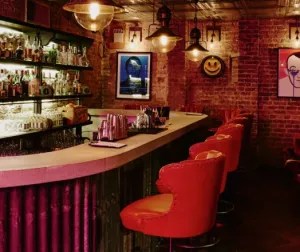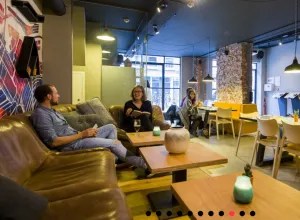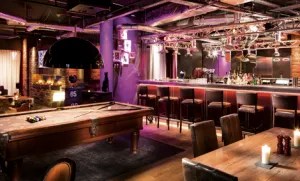by Pádraic Gilligan, Managing Partner, SoolNua
A Musical Analogy
It’s well documented how the business model for the music industry has flipped 180 degrees. In the past bands toured to sell albums, now bands record albums to sell tours. The hospitality sector has also undergone its own 180 degree shift. For the past 50 years global hotel brands like Hilton have provided home from home comfort and predictability for global travellers and built their entire business model on their ability to do so. Today world travellers eschew global hotels like Hilton because cookie-cutter familiarity is not to their liking at all. Today we want local experiences, authentic connections, sights, sounds and smells that confirm we’re in a different place.
Airbnb rampant in Barcelona
This fact alone would explain the rampant success of Airbnb: at the recent city-wide Mobile World Congress in Barcelona, according to Skift’s Greg Oates, 30% of the attendees chose Airbnb. They bought into what is essentially an unpredictable hospitality experience in exchange for local flavour, authenticity and, in some cases, affordability. But Airbnb is not the only entity disrupting hospitality. Hotels are doing it too and, just like the rise of Indie Bands in the music world, these past years have seen a dramatic increase in Indie Hotels. Previously I’ve written about Ace Hotels (they’re opening very shortly in New Orleans), Z Hotels and Citizen M but here’s an update on the latest indie hotels to make it onto my latest playlist:
 So far there are 3 venues in this mini-chain of magnificently eccentric indie properties – in London, Brighton and Cornwall. The London property has just 10 bedrooms and promises “eclectic luxury with a homely charm. Your home from home in West London”. There’s a cocktail lounge and restaurant – both of which has its own dedicated website – and the property is already award winning. Owned by Charlotte and Justin Salisbury, Artist Residence is clearly a labour of great love, described by the New York Times reviewer “like arriving at an (eccentric) friend’s tasteful home”. All of the properties have been decorated by local architects and artists and feature vintage pieces of furniture and unique works of art.
So far there are 3 venues in this mini-chain of magnificently eccentric indie properties – in London, Brighton and Cornwall. The London property has just 10 bedrooms and promises “eclectic luxury with a homely charm. Your home from home in West London”. There’s a cocktail lounge and restaurant – both of which has its own dedicated website – and the property is already award winning. Owned by Charlotte and Justin Salisbury, Artist Residence is clearly a labour of great love, described by the New York Times reviewer “like arriving at an (eccentric) friend’s tasteful home”. All of the properties have been decorated by local architects and artists and feature vintage pieces of furniture and unique works of art.
When I read the statement below from Florian Weitzer, founder of The Daniel Hotel, I knew I’d be a hotel to love:
superfluous pomp and awkward hospitality are simply an unnecessary burden for modern travelers. In fact, what they really want is precisely the opposite: a fast and uncomplicated change of locations, an attractive hotel design and a cool, clear head for taking in new impressions.
Check-in at some chain hotels can be burdensome and irritating. You see the check-in person mentally going through the list of “welcome” questions from the SOP manual when all you want is a warm shower and a change of clothes. You grit your teeth and answer as politely as you can, mindful that he’s just another hospitality guy, like you, doing his gig. At The Daniel design defines the experience but, in common with other indie hotels, this hotel reaches out into its neighbourhood creating spaces, like the lobby bakery (below), where locals and guests collide. Overnight rates are an affordable €98 per room.

 Joke Hotel is exactly what its name implies promising surprises, laughs and lots of fun across the entire guest journey. Part of the Paris based, family owned Astotel Group, Joke Hotel is one of 16 hotels that walk to the beat of a different drum when it comes to hotel keeping and hospitality. They are affordable 3 and 4 star hotels with a strong design ethos and an uncompromising customer service focus – the family has been in the hospitality sector for over 40 years. Speciality Architect Philippe Maidenberg has worked on many of the Astotel properties collaborating with artists to avoid “aesthetical clichés and fads”. Another of the Astotel properties, the recently opened 123 Sebastopol takes its theme from the world of cinema. The architect consulted with such giants of the screen as Jean -Paul Belmondo, Danièle Thompson and Ennio Morricone to create this unique property.
Joke Hotel is exactly what its name implies promising surprises, laughs and lots of fun across the entire guest journey. Part of the Paris based, family owned Astotel Group, Joke Hotel is one of 16 hotels that walk to the beat of a different drum when it comes to hotel keeping and hospitality. They are affordable 3 and 4 star hotels with a strong design ethos and an uncompromising customer service focus – the family has been in the hospitality sector for over 40 years. Speciality Architect Philippe Maidenberg has worked on many of the Astotel properties collaborating with artists to avoid “aesthetical clichés and fads”. Another of the Astotel properties, the recently opened 123 Sebastopol takes its theme from the world of cinema. The architect consulted with such giants of the screen as Jean -Paul Belmondo, Danièle Thompson and Ennio Morricone to create this unique property.
 In a recent article on Generator Hostels, Skift highlighted how corporate travellers are now also looking at hostels not just for their affordability but for their brand and buzz. City Hub in Amsterdam is another example of this trend. As more millennial backpackers join the corporate ladder these new business executives are seeking out the community vibe so central to their hostel experiences all over the world. City Hub replicates this but also offers the security of a private cabin or hub complete with double bed, app controlled lighting and a personal audio streaming system. Best of all is the location:
In a recent article on Generator Hostels, Skift highlighted how corporate travellers are now also looking at hostels not just for their affordability but for their brand and buzz. City Hub in Amsterdam is another example of this trend. As more millennial backpackers join the corporate ladder these new business executives are seeking out the community vibe so central to their hostel experiences all over the world. City Hub replicates this but also offers the security of a private cabin or hub complete with double bed, app controlled lighting and a personal audio streaming system. Best of all is the location:
… located right next to Amsterdam’s De Hallen, one of the most hot and happening places in Amsterdam. And why did we put Cityhub here, you ask? Because we want you to go out and discover the beauty of the city as much as you can. Not just the touristy spots, but genuine Amsterdam as it is happening right here, right now.
 The tagline says it all: Your Neighbourhood Lifestyle Hotels. There are currently 27 PentaHotels across Europe and Asia (mainly in Germany and the UK) but they have a growth target of 50 hotels by 2020. All PentaHotels have a PentaLounge which is a fusion of reception / bar / cafe / lobby and is designed as a gathering place to attract locals and guest alike. While these properties have a distinctive local look, Penta is actually a global brand, owned by the mainly luxury-focused Rosewood Hotel Group. Penta is a perfect example of a global brand trying to respond to the zeitgeist by assuming a indie look – much like the way Starbucks is now re-positioning itself globally.
The tagline says it all: Your Neighbourhood Lifestyle Hotels. There are currently 27 PentaHotels across Europe and Asia (mainly in Germany and the UK) but they have a growth target of 50 hotels by 2020. All PentaHotels have a PentaLounge which is a fusion of reception / bar / cafe / lobby and is designed as a gathering place to attract locals and guest alike. While these properties have a distinctive local look, Penta is actually a global brand, owned by the mainly luxury-focused Rosewood Hotel Group. Penta is a perfect example of a global brand trying to respond to the zeitgeist by assuming a indie look – much like the way Starbucks is now re-positioning itself globally.
Of course Rosewood Hotels are not the only global brand to play the local card. Starwood is doing it with Aloft, Hilton with Canopy, Marriott with Moxy and so on. In each case they create the brand and then build the hotel. But can you actually create a brand and then build the hotel to its specifications?
Pádraic Gilligan is Managing Partner at SoolNua, a boutique consultancy working with venues, hotels and destinations on marketing, strategy and training for the MICE sector.


One thought on “The Indie Scene – hotels that do it different”
Nice stuff, Padraic